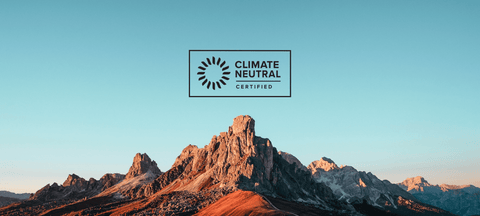Even while facing an unprecedented global pandemic and an atrocious and unprovoked war in Europe, climate change remains an existential threat to humanity—and we have the tools to stop it. The process to become Climate Neutral Certified is a months-long effort to measure, offset, and reduce our carbon footprint. These are actions that all brands—and individuals—can and should take now to “flatten the curve” of carbon emissions.
We are committed to actions instead of words, and we are proud to announce that we are now a Climate Neutral Certified company for the second year in a row.
Publishing Standart in print has been important to us since day one. The ever-present glow of devices shatters our focus and raises our anxiety levels. We believe good content is worth sitting down for, and engaging with, on multiple levels. Reading Standart should be enriching. It should help you to relax from all the surrounding noise, and ignite conversations—just as coffee has been doing for centuries.
But we also understand that print publishing comes with a cost and has a carbon price tag attached to it. Sustainability in the coffee industry and the environment have been part of our content-DNA since our first issue, and today we’re thrilled that we’re able to join 300+ other Climate Neutral Certified brands in taking meaningful action for the climate.
Why now?
It’s no secret that last few years were challenging years for business. In the face of unexpected obstacles, radical pivots, and new ways of working, we’ve learned that we are able to face big challenges as individuals, a team, and a society. Globally, we emit almost 60 billion tonnes of greenhouse gases every year. These are the carbon emissions that cause climate change, and the publishing industry is responsible for a considerable chunk of these emissions due to the resources required to make and publish magazines.
If we don’t take responsibility for this problem now, then there’s no way we’ll hit the 2050 goals set out by the Paris Climate Agreement. These are make-or-break goals. Reach them, and we avoid the devastating effects of climate change. Miss them, and life on Earth will change for billions of people.
We’re acting now because scientifically-vetted solutions to climate change exist, and they are accessible to brands like ours. As a publication covering the good, bad, and ugly of the coffee world, we consider sustainability one of our core themes and values. As Luke Adams, Editor at Standart put it, “We believe in supporting and highlighting the importance of sustainable practices in coffee—not only in ecological terms, but economic, social, and technological—and will brazenly defend our right to fill our pages in this dictatorial fashion.”
How did we get here?
We are connecting the dots by doing our share, in partnership with Climate Neutral, to measure, offset, and reduce last year's carbon emissions. This process took time and resources from our team, but ultimately it’s a reasonable cost compared to the threat climate change poses. Bella Todaro, Certification Manager at Climate Neutral, told us that “Our brands dedicated thousands of hours to understanding and addressing their climate impacts through the certification process.” We were among them.
Measure
We measured our 2021 carbon footprint at 518 tonnes of CO2. It's a tiny speck in the ocean, we know. We are already saving emissions by working remotely, using wood-free paper, but there is still a long way to go. To arrive at this number, we looked at all of the emissions created from making and delivering our magazines, including our supply chain emissions, team member commutes, business travel, and utility bills.
Offset
We “zeroed out” these emissions by purchasing carbon credits. These credits we’ve invested in three nature-based, 1% for the Planet eligible, projects.
Project 1: Improved Forest Management in Alaska, USA
TThe Bluesource - Shaan Seet Improved Forest Management Project is an improved forest management project on Prince of Wales Island in the Alaskan Panhandle, owned and managed by Shaan Seet, Inc. It includes higher elevation regions, recently deglaciated lands, wetlands, beach fringes and 7,000 acres of old-growth forest. The now-protected forestland was used in the 1980s to supply timber to nearby timber corporations and pulp mills. More recently, Canadian mill demand for pulpwood from Southeast Alaska has driven up the price for pulp logs, which increases the potential for aggressive forest management practices and shorter rotations in the region. To meet demand for wood products, areas of Shaan Seet, Inc. lands, which were actively managed for timber, were clear cut using helicopter or cable logging.
Without the project, the area could feasibly resemble that of other industrial forestland in the region. The project will protect the land from development over the next 40 years and ensure continued environmental benefits through the preservation of old-growth sections of forestland. In addition to preservation, the project helps protect five different species of fish including sockeye salmon, coho salmon, chum salmon, pink salmon and steelhead trout. You can read more about the project in this link.
Project 2: Solar Energy in Gansu Province of China
The project is a grid connected photovoltaic power plant located in Zhongyuan Village, Jingyuan County in the Gansu Province of China. The renewable energy generated by the project is fed into the Northwest Power Grid, replacing mainly fossil-fuel (thermal coal) generation and the associated carbon emissions and local pollution.
The project avoids over 125,000 tonnes of CO2e emissions annually. It has reduced the carbon intensity of the region’s power generation and has increased the diffusion of modern, clean power technology in this region of China. More on this project here.
Project 3: Sispara Wind in India
The goal of the Sispara Wind Project is to generate wind energy near Maharashtra, India to reduce dependence on fossil fuel energy. Eight wind turbine generators with a total capacity of 35.5 MW are located in the Sangli and Satara districts, in the state of Maharashtra. Renewable energy generation is a reliable solution to climate change because it helps displace our reliance on energy from fossil fuels. This project expands renewable energy production to reduce dependence on traditional electricity sources, and stimulates local job creation. Read more here.
Reduce
Last, but not least, we created Reduction Action Plans to help lower the emissions we produce over the next 12–24 months.
- We introduce environmentally-friendly packaging across our supply chain;
- We switch to using mix or 100% recycled paper inside Standart;
- As a subscription-only publication, we build our own sales channels to reduce waste and cut the third-party distributor logistics;
- We embrace distributed teamwork and production.
I’m sharing the details of our process for two reasons: 1) Our readers deserve transparency, and I want to show how we’re working to live up to our claims of climate responsibility. 2) I hope that other brands will see what we did and become inspired to take action. I’m happy to address any questions about what it takes to become Climate Neutral Certified.
What does it mean to be Climate Neutral Certified?
Starting today, all issues of Standart and Standart Japan will bear the Climate Neutral Certified label. Climate Neutral is a nonprofit committed to solving climate change by making carbon neutrality simple and accessible. The label is essentially shorthand for the process outlined above. Austin Whitman, CEO of Climate Neutral says, “Consumers hold massive power to shape the economy, and their power is exerted through the actions of the brands they support. With our climate label, we’re helping consumers find the brands that are willing to invest immediately in climate solutions.”
The 300+ brands certified so far this year all went through the same process to measure, offset, and reduce their emissions, neutralizing about 700,000 tonnes of carbon emissions. These companies offer products and services across a wide range of industries, from apparel to independent print magazines about coffee.
To the future
We’re thrilled to be in good company with this year’s Climate Neutral Certified brands. We believe in Climate Neutral’s mission of taking action now to solve a problem that we understand to be an urgent threat. We’re glad you’re with us for the journey. Let’s work together to tackle climate change faster.
Thank you for reading Standart!



